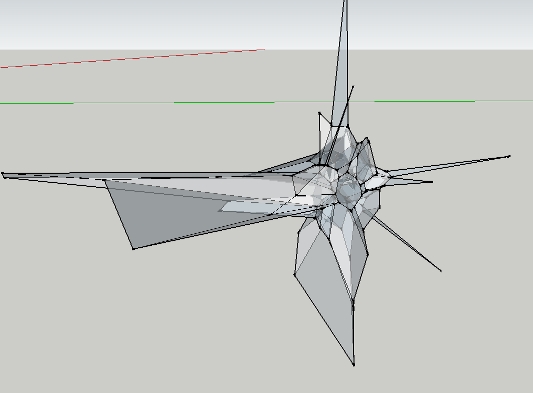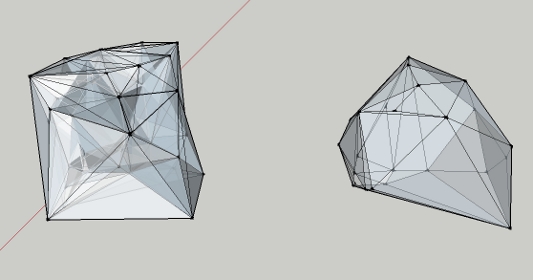I know there was a plugin produced for this a while back, but I wanted to make something that was fully integrated. So, hopefully no offense to the previous developers. I didn't build off anyone else's work, all from scratch.
This plugin uses the Qhull libraries to produce voronoi, convex hull, delaunay, and half point shapes. Everything is managed by the plugin, so no need to produce data external to SU.
In the plugins menu, under Qhull, there are 4 submenus:
Voronoi - produces voronoi shapes, which tend to be rather spiky.
Convex - produces solid, convex shapes that are a 'shell'
Delaunay - produces 'mostly' solid (may have holes), convex shapes that contain a lot of internal structure
Half - produces 'mostly' solid, convex shapes, not sure what else the generated data is supposed to represet... 
Each submenu has items for:
Small: uses 10 random points
Medium: uses 50 random points
Large: uses 100 random points
Huge: uses 500 random points
Selection: uses the vertices of the selected data
Voronoi has some extra options that attempt to produce better visual results
Selection (sphere) - adds an array of points in a sphere around the selection. Usually produces more 'knobby' results
Selection (cube) - adds an array of points in a cube around the selection. Usually produces more of a 'star' result
Selection (free) - doesn't add any extra data. Typically produces VERY spiky results.
Qhull will not always generate valid data, especially from selection. The plugin will usually warn you if it doesn't produce valid data.
Also, delaunay can produce A LOT of data, so be careful when using it from selection.
Half point tends to produce physically very small shapes... I don't know why. I don't really know the math behind that one.
I don't have much time to update these, so... sorry if I'm not able to make much in the way of improvements. I hope it's useful!
The zip contains the rb and a qhull directory with the executables for Windows in it. Just extract to your plugins directory. Sorry, don't know what it will take to update for Mac.
And, of course, QHull is copyright by the Geometry Center, qhull.org.









